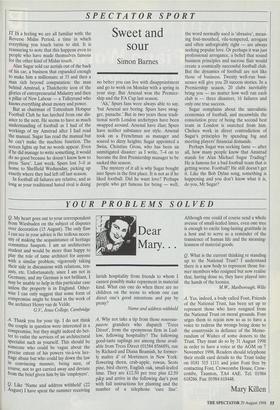SPECTATOR SPORT
Sweet and sour
Simon Barnes
IT IS a feeling we are all familiar with: the Reverse Midas Period, a time in which everything you touch turns to shit. It is reassuring to note that this happens even to people who have made themselves famous for the other kind of Midas touch.
Alan Sugar sold car aerials out of the back of his car, a business that expanded enough to make him a millionaire at 33 and then a man rich beyond computation: the man behind Amstrad, a Thatcherite icon of the glories of entrepreneurial Midastry and then a pillar of New Labour — a Talleyrand who knows everything about money and power.
But as chairman of Tottenham Hotspur Football Club he has lurched from one dis- aster to the next. He seems to have as much understanding of football as I had of the workings of my Amstrad after I had read the manual. Sugar has read the manual but he can't make the machine function. The screen lights up but no words appear. Even if he did manage to write something, it would do no good because he doesn't know how to press 'Save'. Last week, Spurs lost 3-0 at home to Sheffield Wednesday, picking up exactly where they had left off last season.
In football all failures are relative, and as long as your traditional hated rival is doing no better you can live with disappointment and go to work on Monday with a spring in your step. But Arsenal won the Premier- ship and the FA Cup last season.
All,' Spurs fans were always able to say, `but Arsenal are boring. Spurs have swag- ger, panache.' But in two years these tradi- tional north London archetypes have been swapped around. Arsenal have élan; Spurs have neither substance nor style. Arsenal took on a Frenchman as manager and soared to dizzy heights; Sugar appointed a Swiss, Christian Gross, who has been an unmitigated disaster: as I write, 7-4 on to become the first Premiership manager to be sacked this season.
The mystery of it all is why Sugar bought into Spurs in the first place. It is not as if he liked football. Did he want love? Perhaps people who get famous for being — well, the word normally used is 'abrasive', mean- ing foul-mouthed, vile-tempered, arrogant and often unforgivably right — are always seeking popular love. Or perhaps it was just professional arrogance, a belief that sound business principles and sucrose flair would create a cosmically successful football club. But the dynamics of football are not like those of business. Twenty well-run busi- nesses will give you 20 success stories. In a Premiership season, 20 clubs inevitably bring you — no matter how well run each club is — three disasters, 16 failures and only one true success.
Sugar complains about the unrealistic economics of football, and meanwhile the consolation prize of being the second best team in London is snatched from him. Chelsea work in direct contradiction of Sugar's principles by spending big and meeting players' financial demands.
Perhaps Sugar was seeking fame — after all, how many people know that Amstrad stands for Alan Michael Sugar Trading? He is famous for a bad football team that is getting worse. Football? He still doesn't get it. Like the Bob Dylan song, something is happening and you don't know what it is, do you, Mr Sugar?


























































 Previous page
Previous page